Until 3 years ago, Ukraine did not have an institution that would systematically and strategically deal with the presentation of modern Ukrainian culture abroad — the way the British Council, the Polish Institute, the Goethe Institute, etc. have been doing for decades. In 2018, the Ukrainian Institute was established as an institution in the field of management of the Ministry of Foreign Affairs, whose mission is to “strengthen the international subjectivity of Ukraine through cultural diplomacy”. The first head of the UI, who, together with the team, developed the principles of its functioning, vision, and strategy, was Volodymyr Sheiko — a cultural manager, diplomat, and international political scientist by education, who previously worked in the British Council. At the end of 2021, Volodymyr won the election for the position of General Director for the second time and will head the Ukrainian Institute for the next three years.
On January 18, Volodymyr Sheyko was appointed to the post of General Director of the Ukrainian Institute. We wondered what could motivate a young cultural manager to enter the mainstream of work in the public sector for the second time, and even at a time when post-Maidan institutions were falling into a zone of turbulence. We want to talk about how the narratives laid down in childhood influence approaches to cultural diplomacy, how family and individual memory are intertwined with the collective as well as about how to “sell” the brand of the country outside, which is not fully formed inside. And also, we want to discuss fairy tales and children's memory of historical events.
Our conversation was recorded before signing Volodymyr's contract as a general director, so it does not take place "within the limits and in the manner provided for by Ukrainian legislation", but as a dialogue between two cultural managers.
It also took place the day after the Ukrainian premiere of the Songs for Babyn Yar project, created with the support of the Ukrainian Institute: a musical performance that, in a very discreet, intimate way, tells about the tragedy of the Holocaust in Ukrainian territories. This event largely determined the scope of the conversation.
On the role of collective historical traumas in cultural diplomacy
I didn’t plan to start with this, but it just so happened that yesterday we both watched the same performance — Songs for Babyn Yar. What did you feel during the show?
I felt great gratitude to everyone who made this performance possible. This is an extremely delicate statement about a tragedy, the extent and horror of which I cannot rationally understand. At the beginning, it was a big challenge for me to understand: how we, as a state institution of cultural diplomacy, can talk about such immense things, without the development and understanding of which we cannot think of ourselves as a state, as a community, or as people.
The experience of this performance was superimposed on my personal loss [three weeks before the conversation, Volodymyr's mother passed away — writer, playwright, poetess, theater critic Nelya Sheiko — Medvedeva — author. ], and this, of course, intensified my feelings. But I did not want to rationalize this experience; I just gave myself to it, and it completely absorbed me. I have been consumed by the incredible singing of Svetlana Kundish, Mariana Sadovska, Yura Gurzhy, which reached very ancient times ...
Sorry for this question, but: how does one experience a collective trauma during a personal loss?
It brings relief to grief.
Svetlana, Mariana and Yuriy created not just a performance, it was a kind of kadysh, a requiem... Tell me, can collective grief work as a language of cultural diplomacy?
It can and should. I'm not interested in emasculated cultural diplomacy that only uses tools borrowed from corporate marketing. The kind of diplomacy that is interesting is the one that gets into a person because of emotions. This does not mean that we should manipulate them. On the contrary, we should be very balanced about difficult topics.
Songs for Babyn Yar is an example of how to tell the world about the tragic pages of your past without abandoning them. It is about how Ukraine rethinks this tragedy, how it takes the right steps, makes mistakes, how we return the forgotten and what we do with it. For this, emotional living is absolutely necessary.
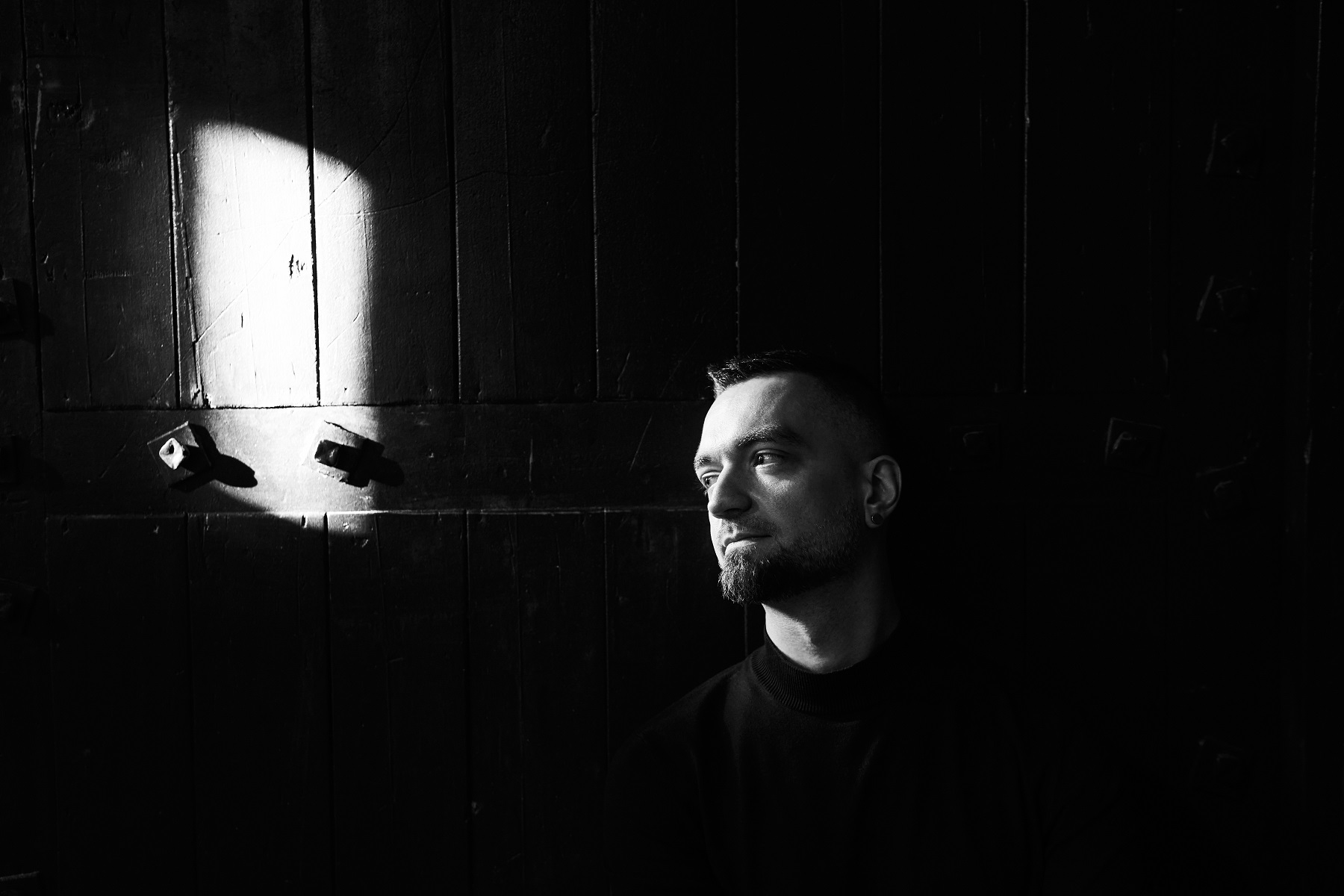
Is Ukraine regaining its historical memory in general? How do we deal with tragedy?
"We" — like who?
Good question. Okay, "we" can mean a community, a nation, a state, and it can be three different stories.
That's what I keep saying. It can be an individual experience, a family one… We, as a political nation, as a state, have been comprehending the Holodomor for a long and difficult time, but thanks to these efforts, most Ukrainians have appropriated this tragedy, realized it and have honored its memory.
Holodomor probably yes. And the Holocaust? Let's say, during the last Hanukkah, which ended two days ago [at the time of the recording of the conversation — ed.] in a number of cities, street menorahs were vandalized [holiday lamps — ed.]. What does this say?
Yes, the situation is more complicated here. We, as a society, still know very little about this tragedy, except for basic facts. Therefore, unfortunate manipulations have happened, which are now expressed in the work of the Babyn Yar Memorial Center.
The existence of two conditionally competing projects [ the second is the National Historical and Memorial Reserve "Babyn Yar" — author. ] is a symptom of lack of utterance and reflection. Memorialization as such is now impossible: we — society, different communities living in Ukraine, and the State — have not agreed on what we actually memorialize and why.
Look, there is a “Memorial Center” — a powerful colossus, sponsored by Russian oligarchs, actively broadcasting its own, rather dangerous, narratives. And there are such small projects that pronounce this tragedy in a different way. Can we, with careful, quiet stories, compete with this "sweep"?
And these are all questions of resources. The task of the "Memorial Center", as I see it, is not the memorialization or commemoration of the victims; that's the problem. This is the dominance of form over content, the constant generation of breaking news, megalomaniacal infrastructure ambitions, and the desire to impress and replace the memory of the victims with pseudo-artistic or political statements, which is therefore opportunistic.
But what we saw in the project Songs… is an attempt at a very quiet, delicate, moral statement about Babyn Yar. It does not give unambiguous answers, but asks a question, weaves into one work of art the cultural polyphony that has always existed in Ukraine.
I often remember Johanan Petrovsky-Shtern's book The Golden Age of Shtetl, which for me is a confirmation of how much we should integrate Jewish history into the general history of Ukraine, and how much it is still alienated.
It is no secret that in the minds of many people abroad, Ukraine is an anti -Semitic country. Ukraine can go to the central squares of the main cities of the world and say, “We are not anti-Semites!”. Will it solve the problem of the country's alleged anti-Semitism? It will not. We must work with that nuanced and very delicate field in which stereotypes, prejudices, fears and beliefs appear, and this is always the field of emotional and personal experience. And if you skip this field, you will never root an alternative narrative.
Our task is not to object. Our task is to say: in Ukraine, there also have been cases of anti — Semitism in everyday life; but as a whole, Ukrainian society is not xenophobic.
Look how the world today is trying to deal with the opponents of vaccination. I recently returned from a very interesting program in the United States that dealt with disinformation in the modern world. Each country hits a glass ceiling beyond which it is impossible to convince the rest of its citizens of the need to vaccinate. Beliefs are often irrational, they consist of individual life experience, feelings, acquired information... Therefore, at some point, mass communications lose their effectiveness, and you must start a small-scale approach, personal conversations, in particular, the language of art.
Can culture work with topics like anti-vaccination? In general, can culture radically change something?
I will allow myself a positivist assumption that we are not talking about culture as a whole, but about general humanitarian knowledge, which forms a resistance to such things. In this case, the obvious and sad conclusions begin. The level of humanitarian knowledge — not only in Ukraine, this is a global trend — is extremely low, and this disarms us in the face of challenges, manipulations, and poses the need to think critically.
This is multiplied by a crisis of expertise and professionalism. In a quasi-egalitarian society where everyone has "access to the microphone" and truth no longer exists, these categories lose their meaning.
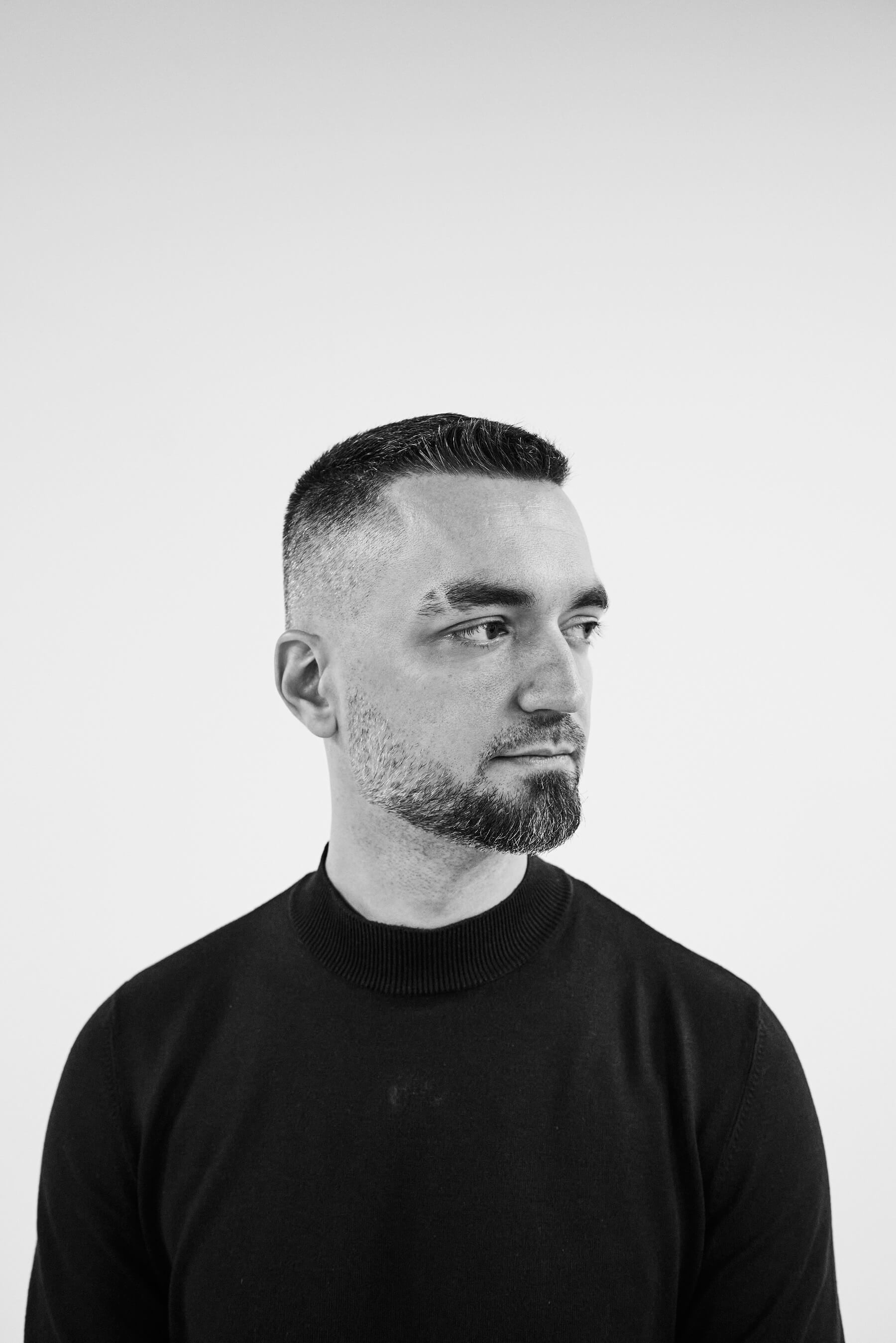
We started with a conversation about collective historical traumas, moved on to disinformation, and at the intersection of these two topics, I cannot help but touch on the issue of the Holodomor Museum and the falsified figure of 10.5 million dead. What does this situation indicate?
This situation is extremely dangerous for the subjectivity of Ukraine and its institutions in general. This museum is the main center of scientific research and a source of verified data on the history of the Holodomor. A derivative of its work is the recognition or non — recognition of the Holodomor at the political level by governments of other countries, which Ukraine has been working on for many years. The task of this institute is commemoration, research, dissemination of historical memory, and, consequently, political decisions both within Ukraine and abroad. This scandal may forever put an end to the trust by foreign institutions and states in the main source of information about the Holodomor in the world. Imagine if Yad Vashem began to manipulate data on the victims of the Holocaust.
Time will tell where the roots of this situation are, but we need to immediately take control of this now and stop what led to it.
With what counternarratives are you going to respond to this situation as a Ukrainian Institute?
There is a ministry to which the museum, civil society and media are subordinate, which must conduct its own independent investigations. We, for our part, can rely on verified data generated by scientists and speak about this topic in the international environment through artistic, expert, and debatable statements. The Holodomor theme is in our plan for 2022.
But we do not want to talk about it exclusively from a victim position. It is important for substantiating the negotiation efforts of Ukraine so that the Holodomor is recognized as a genocide by the governments of other countries. But it cannot lie only in the plane of talking about the number of victims. Here it is necessary to talk about the context, causes, historical circumstances, and totalitarian politicians. It should be deeper, more subtle, and with respect for the dead.
Did your family talk about the Holodomor?
In my family, this story was retold thanks to my great-grandmother Marina, who was from the Donbas. My great-grandmother told her daughter very little about this, but she told my mother a generation later. For a long time, she did not want to talk about it. She simply called it a hunger strike, but then she began to share her memories.
She had 13 children, and as far as I know, all of them survived the Holodomor. This is a great human feat of great-grandmother Marina: she worked in Mariupol, walked tens of kilometers home, collected food, and worked all kinds of jobs.
After the Second World War, only my grandmother, the last, the thirteenth, remained of the children. Others were carried away by war: illness, repression, the NKVS.
Great-grandfather Dmitry committed suicide during collectivization because he warned the neighbors that they would be dispossessed. He advised them to flee the village or hide property. And, realizing that he and his family would be sent to Siberia or executed "for treason", he committed suicide, deflecting the blow from his relatives. However, this tragedy haunted them for a long time because the families of such people were automatically considered “unreliable”.
I remember many retellings of my mother about the testimony of grandmother Marina: about death on the streets, about people who flew into their house, attacked the potatoes lying on the table, or ate fish washed up on the shore of the Sea of Azov, and immediately died in agony because they had not eaten for weeks ... All this was part of family history, which is why it was so important to me when the Holodomor began to be honored at the state level and when the Memorial was founded — a place where you can come and share this grief with others.
And now this experience convinces me that in our cultural diplomacy, in our cultural policies, we cannot avoid these topics. We will not be human if we do this.
Do you throw away bread?
I can not. Never. I can put it where the birds will eat it, but I can't put it in the trash. And I can't leave food on my plate.
It has already happened that during just the 20th century we have a series of unspeakable tragedies — the Holodomor, the Holocaust, 1937, Volyn, Chernobyl ... And on the one hand, this is what the world should know about us. On the other hand, it is too easy to slip into the narrative of victimhood. Where is this delicate balance?
I recall the texts of Oksana Pakhlevska, who says that the historical timeline of Ukraine is paradoxically directed not to the future, but to the past. When we take a step forward, we must first take 10 steps back into history, and this leaves an imprint on how we share ourselves with the world.
I am not a supporter of building cultural diplomacy on traumas and tragedies, but this is an integral part of our identity, so without it, the conversation about us would be incomplete.
An example is the German experience. The Germans should be given credit for how they work with the topics of World War II, the Holocaust, and Germany's colonial past in Africa through the network of the Goethe Institute... But working with complex topics does not prevent Germany from leading the world soft power rating. In addition, the Goethe Institut works with modern theater, music, literature, and art, which is cut off from the traumatic past of Germany, and shows a different Germany today.
And in Ukrainian cultural diplomacy, the leading place should be left to cultural practices that are happening today about today and the future, which are not rooted in our traumas.
About cultural polyphony and a country that has not yet understood itself
Tell me, what new things did you learn about your country while working at UI?
Our work is a daily rediscovery of our country, knowledge of contexts, regional characteristics, forgotten names, and phenomena that have fallen out of sight because they were not in educational programs. The same Kharkiv school of photography, about which we did a project, was almost unknown to me before, but I understand its aesthetic and political value, so that UI can work with it.
For me, this is evidence of tectonic change — that a state institution can choose such a radical phenomenon for international promotion ...
It's just that the State should not shy away from those topics that take someone out of their comfort zone, including the simple preferences one.
I really appreciate what Yarina Tsimbal and other researchers of our 1920s and 30s are doing. What the Dovzhenko Center has been doing in recent years with its modernization and rethinking of the Ukrainian film heritage of the Soviet period. And what interesting literature, scientific heritage, and social activities of Ukrainian post-war emigration!
Until a certain age, I had a false idea of Ukrainian culture as ethnocentric. But I came to the Ukrainian Institute with the premise that we represent the entire plurality of Ukrainian identities.
For example, more than two years ago, I conceived the Crimean UI program, which will now develop in sync with the political tool — the Crimean Platform. In addition to the cultural program of the inaugural summit of the platform, we created a performative project “Crimea. 5 am” about political prisoners, civilian journalists and Crimean Tatars illegally imprisoned by the occupying authorities in Crimea. Performances have already taken place in Ukraine and Poland. Germany, the USA, and Britain are in the queue. This is an example of a “here and now” story to keep the topic of Crimea on the international agenda.
Okay, but how to “sell” a country that knows little about itself, that hasn’t spoken about itself, has underestimated itself?
You're selling fluidity, and that's terribly interesting. This is freedom. You don't sell anything already formed —
a finished picture, a square, a mobile phone — you give people a tool that they can use to get to know Ukraine further. This "underformation" is a field of tension, which gives the meaning of cultural diplomacy.
As Sofia Dyak likes to say [Director of the Center for Urban History of Central and Eastern Europe — ed. ] on the example of Kazimir Malevich, sometimes it is not artifacts that are important, but talks about them. And here Ukraine is very free to talk about the past, about the present, about the controversial heritage, and about its communities. In these conversations, an incredible cultural richness is born. It is important for me that thanks to the work of the UI, Ukraine gets rid of its secondary, inferiority, and victimization complexes. After all, our culture is a fantastic kaleidoscope of themes.
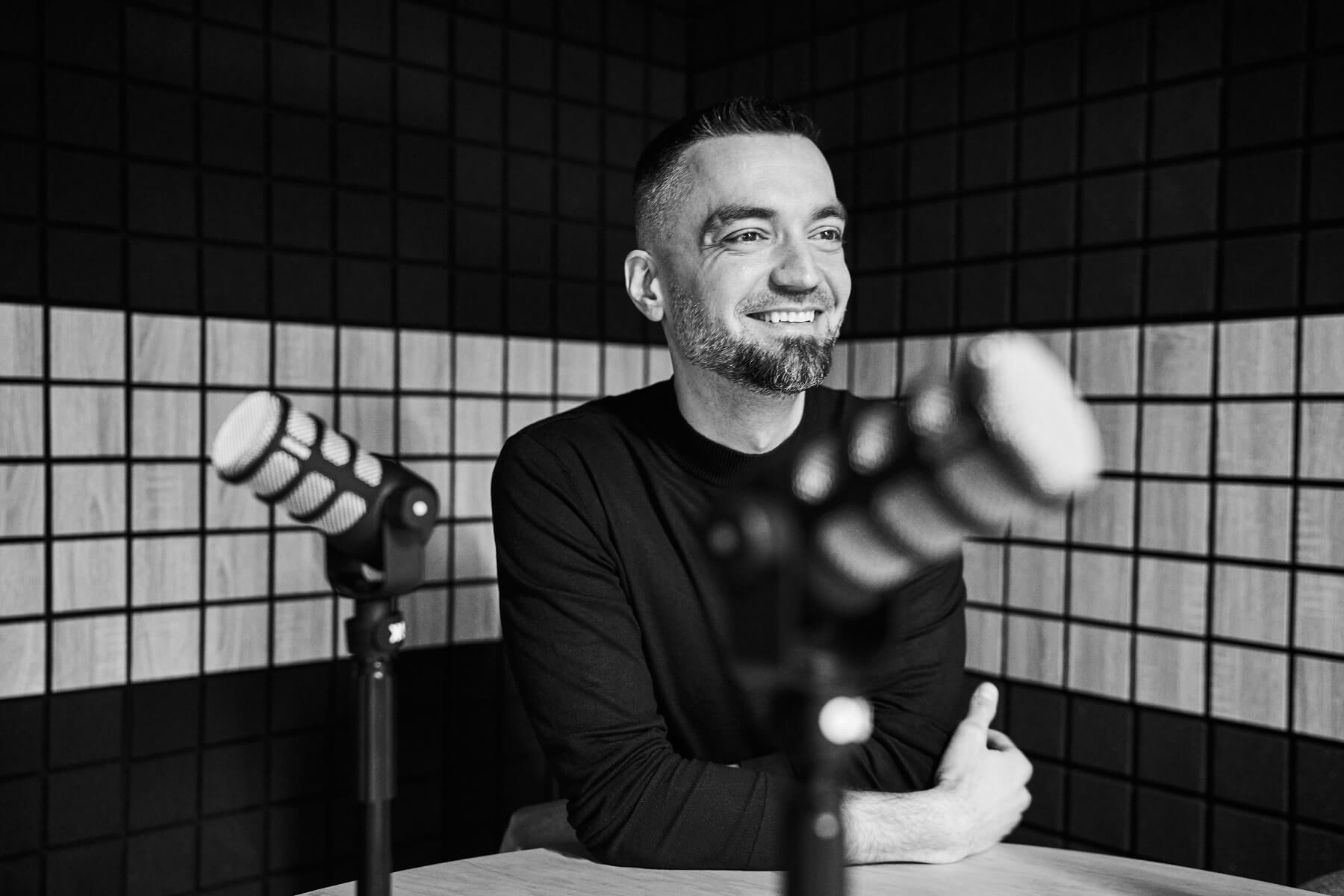
Isn't it tempting to present something of value to you as universally valid?
I made it a rule not to be guided by my own taste and preferences. The Ukrainian Institute has projects that I, as a spectator-consumer, may not like. But I have to give my team (which is also a polyphony of opinions and backgrounds) the right to form their own expert opinion. We do not form the "only correct" image of Ukraine — this would be meaningless.
On the fluidity of identities
And what does your own “Ukrainian identity” consist of?
My identity is based on the fact that I was born here. I was lucky to be born in Kyiv — this is equidistant from all extremes. There are many regional identities in my family — the Chernihiv region, the Donetsk region, the Lemko region, Galicia, the Moscow region, Italy ... This mix for me is a collection of action-packed stories. And, of course, the Lemkos identity of my mother’s side of the family is important to me. This is the already almost lost part of Ukrainian polyphony, language, folklore, and traditions, and all of this I still remember in my family as if it were yesterday.
But most of all, I am interested in Ukraine as a territory of amazing freedom. Perhaps most of all I appreciate this love of freedom and plasticity of identities. Me now and me ten years ago are very different people...
But are they both “Ukrainian”?
Certainly.
Is there any “right” and “wrong” Ukrainian?
Volodymyr raises an eyebrow sarcastically, they both laugh.
Okay, let's try to catch you on another one. Are you in general a consumer of Ukrainian art? Do you have artistic tastes in other cultural regions?
No, that won't work.
What's won’t work?
It’s won’t. How can I communicate a country abroad if I do not consume it myself?
Okay. What do you have on your bedside table?
Are you sure you want to know? (laughs)
Yeah. Show me yours—and I'll show you mine.
Mom's novel, the main work of her life, Last Night. The Istanbul Diary of Oleksa Grishchenko, My Years in Constantinople, 1920 — 1921. Oleksander Granach, Here Comes a Man. The story of Olga Tokarchuk. Well, now you will say that this is banality, but — Khvylovy.
I will not say that. I have it too. Moreover, the avant-garde is for many people the entry point into our identity.
Here actually: Khvylovy, Domontovych, Pidmohylny, and Johansen are the building blocks on which I now rely, and which were almost non-existent in my life 10 years ago. I am grateful to these people for myself, you, and those who are important to me today. And I, as well, cannot think of losing all these people who were simply wiped off the face of the earth for many decades.
The fact that now we are discovering them for ourselves and introducing them into a conditional "canon" is our great happiness because otherwise, we would be without ground, and this would be very scary. I am grateful to them because I have something to stand for with two feet on the ground.
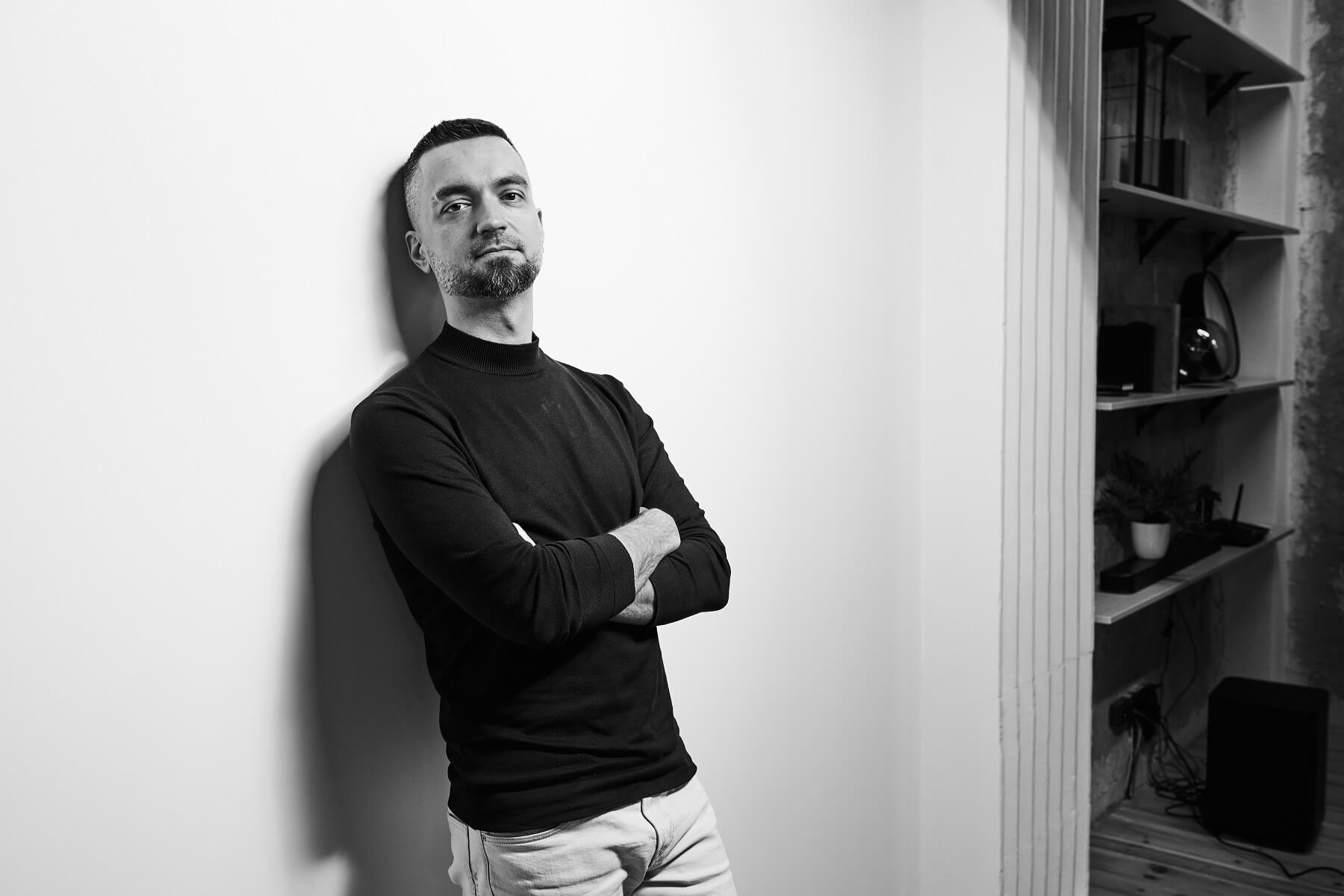
About institutions during turbulence
You again raced in the election for the position of General Director of UI at a moment of maximum turbulence, when the institutions of the latest design are simply bowing under the onslaught of forces that do not really like all your independence, transparency ... Why did you do it again?
The work is not finished. 45 people. I am responsible for this.
Seriously though, this is a cause I believe in unconditionally. And I'm not ready to throw it away halfway. This is a start worthy of continuation, and with these people. I feel responsible for the team, especially since many of them came to UI at my personal invitation. I want to leave this institute when I know that without me it will continue to exist successfully, and that time has not yet come.
Do you believe that these newest institutions can stand? That they are already the basis (or evidence) of the new corporate code of the State?
There is no state corporate code yet. In some places, it seems to me that this state exists purely on a series of happy accidents. In some processes, there is iron logic, and in some it is completely absent.
But these new institutions — not only cultural but also such as Suspilne or the National Health Service — can only survive if they are the opposite of what is expected of them. They must have their own voice, be public, professional, have the right and opportunity to defend their own position, and mobilize civil society. They must be so subjective that It would be very hard to destroy them.
What can we, as a civil society, do?
Despite the fatigue, do not lose vigilance. Unite, talk with each other, with other social “bubbles”, talk as much as possible about the need for culture for the whole country, not tolerate dishonest play, offer new ideas and solutions. It was for this purpose that, say, the Coalition of Cultural Figures was created, for which I am rooting hard.
Do not act chaotically and do not lose contact with each other when the task for which we situationally mobilized has already been solved.
Public disclosure should be complemented by direct communication with decision-makers. We are more inclined to take to the squares with banners, often forgetting about the power of a balanced, reasoned conversation.
Why is it easier for us to be involved in revolution than in evolution?
Because evolution requires, as Yevgeny Glebovitsky says, the ability to translate from one language to another. Business, government, civil society, culture, media icons, doctors… all these wonderful professional bubbles, in which wonderful people work, do not know how to communicate with each other.
Are you more inclined towards evolution or revolution?
When I started working at UI, it was a "revolutionary situation". It was necessary to quickly create something from scratch, preferably not forgetting why it was being done. Entering the second cadence, I chose an evolutionary path. I want to keep what we have developed over three years, give the team predictably, the opportunity to breathe a little, and work with less strain. Further revolutions are not needed. Further painstaking daily work is needed.
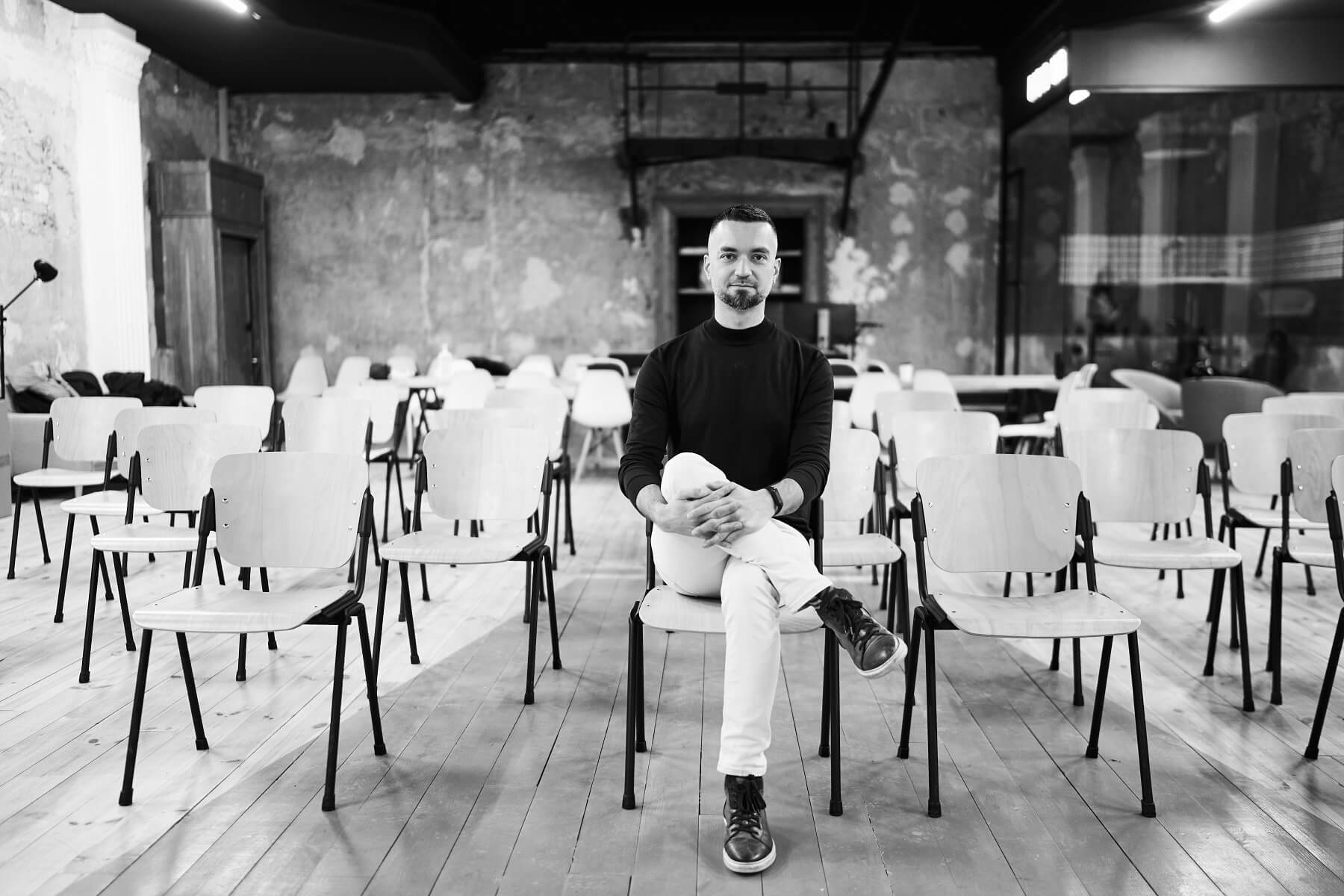
On the role of rules and boundaries in work and personal life
Are co — projects with different partners also a way to strengthen this loyalty?
This too. And it's also scaling. There are 30 conditional people — with limited funding, in the grip of the Ukrainian bureaucracy. On their own, they can do, say, 10 projects in a year. And with partners already 50.
Foreign partners are entry points to other countries. Many partnerships are based on trust, especially in so-called "red" cultures, where personal contacts are more important than institutional ones. Ukraine here is on the verge between red and blue. We still have very developed horizontal ties, a strong culture of personal agreements, are accustomed to circumventing any rule, and trust in specific people. But we've already gotten to the point where we want to build institutions, processes, and rules that we're willing to follow, even if we don't like it.
I tend to be more blue, someone who chooses institutionality, processes, and rules, but I am also a product of my borderline culture.
And in life?
I work more and more on building these boundaries: what you allow others and where you are ready to stop yourself. It's about freedom and independence. This is important so that you are not torn to pieces. This is also about the pleasure of life, which at some point I almost lost.
I admit that when you become the head of a state institution, private boundaries seem to blur a little and your whole life seems to fall under the spotlight ... What has changed in your life with the transition to the public sector?
It gave me a giant professional leap forward. The British Council in many ways shaped me as a specialist and person, but my work there has exhausted itself, and I intuitively understood that this leap is possible in the public sector. And when UI was founded, I decided to try my hand, and it was a very good choice. Yes, there was very little leisure. There is also very little of myself — as a person with his own interests and hobbies ... That's why I say that it is important to build boundaries. I gave myself completely to my work, so now I have to find myself again.
About life outside of work and the consequences of family education
And what does your life outside of UI consist of?
Now [after the election, but before the appointment — ed.] I spend more time with friends and relatives. Most of my life I was occupied by my mother and took care of her. Now I have alone time, which I really appreciate.
In general, no matter what we are talking about — books, travel, meetings — it's all about knowledge. The pursuit of the new may be a bit of a compulsive attraction, but it is what keeps me moving forward.
Travel — where to?
Among other things, I love Istanbul very much. It’s one of the most fantastic places on Earth, which once pretty much restored me. What draws me to it? The tragedy of the fall of Byzantium and its symbiosis with Islamic culture; the entrepreneurial spirit of people and the kind of life they fill this city with — from fishermen fishing in the Bosphorus to those who keep cafes, restaurants, and build housing ... This city seethes with an entrepreneurial spirit that Turkey has not lost because it did not have a totalitarian past, there was no interruption of the tradition of natural economic relations. There is a rooted tradition of philanthropy and entrepreneurship in culture. It is interesting to observe how a sphere of culture different from ours is built and how it passes the test of strength when society moves towards a conservative, authoritarian direction. However, Istanbul is a city where you can be anyone and no one, where any of your desires can come true.
You spoke of a continuous stretch. Is there a family legacy in what you are doing now? Is where and who you are now a consequence of your upbringing?
I owe this primarily to my mother. She was a writer, playwright, theater critic, and teacher of Ukrainian language and literature. She created my world this way — based on culture, knowledge, and creativity. She helped me set up moral parameters: the limits of what is permitted and what is not permitted. This is a priceless gift.
Mom was also the author of children's fairy tales. Is Mom's fairy-tale world the world of your childhood?
Certainly. We invented fairy tales during walks and before going to bed. She encouraged me to fantasize, invent stories about myself and my alter egos. Later, on the basis of our stories, my mother wrote three cycles of fairy tales, which she wanted to sign with our common authorship. I plan to release them someday.
And childhood is the world of the theater because my mother’s plays are still going on in all regions of Ukraine. She always took me to her premieres.
What's left of your childhood alter egos in you?
Adventurousness, which sits very deep, but sometimes still crawls out. (laughs)
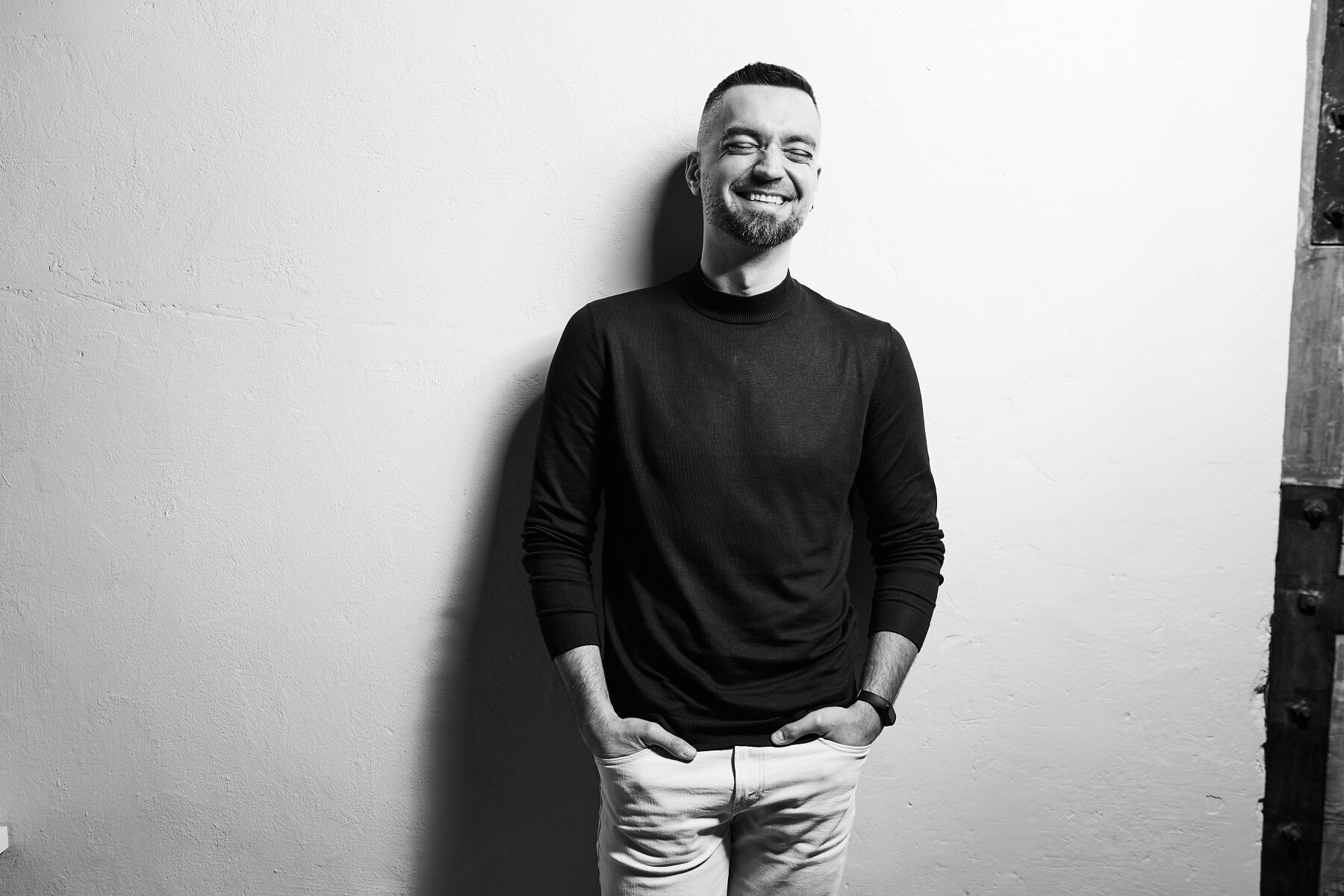
Were there performances at home?
I put on shows for my parents. I myself came up with a scenario, collected objects from improvised means, and did scenography. The characters were toys or just some objects. It was my ritual to reproduce what I saw in a real theatre.
Is cultural management a sublimation? Does it replace your own creativity?
Do not belittle this role, it is no less creative. Although I live with an unwritten book complex, I am quite satisfied with the role of the organizer. I know my virtues, I can write well, I could go into science or be creative, but then I saw what a catharsis the project Our Singing for Babyn Yar has become for its participants, and once again I thought that cultural management is help for talented people to realize themselves.
Let's go back to the family. What memory does your mother's Lemkos heritage give you?
Mom gets her Lemkos heritage from her dad. Her father was forcibly evicted from the Lemkos region in 1944 when about a third of all Lemkos were evicted to the Soviet Union within the so-called "border population exchange" between the Polish Republic and the USSR after the de-occupation of Poland. Therefore, my grandfather ended up in the Donetsk region and met my grandmother there. It was the village of Krasnoarmeyskoye — now Khreshchatytskoye. It is now in the occupied territories, so I, unfortunately, do not have access to archives that would have told me about the fate of my ancestors. Later, the family moved to the Lviv region, where my mother was born.
Grandfather spoke the Lemkos language until the end of his life, like all the neighbors on our street. Boryslav Street (now Lemkovskaya) was almost completely populated by settlers who occupied the houses of the Poles evicted to Poland.
Mom never spoke Lemkos in everyday life. She spoke Ukrainian with her grandfather. But as it turned out later, since the beginning of the 1980s, she had been writing poems and stories in Lemkos “for her desk drawer” in the beginning of the 1980s, which subsequently formed the book “Roads of Stones” (Komora publishing house, 2018). This is the voice of an entire generation, embodied in magnificent literary texts.
Who were the people you grew up with?
Adults who expanded the boundaries of my world. In addition to the family, these were my mother's friends — playwrights, theatergoers, writers, teachers ... Dad's friends are Ukrainian politicians. He was also a representative in the Verkhovna Rada [parliament] of the second convocation, so family life was imbued with politics.
I hated the broadcasts of the Verkhovna Rada on TV because they were on at the moment when I needed to watch cartoons on another channel. And this was the 90s, independence was proclaimed, the hryvnia [Ukrainian currency] was introduced, the Constitutional Night took place.
Which of the historical events remained in your childhood memory?
The Constitution.
Dad was not at home at night, for days; it was his convocation. His signature is also on the first page of the original copy of the Constitution, which I am proud of. I remember this terrible tension around the Constitution, his stories that they were trying to rewrite it, break it, not accept it ... And when it was already accepted, he somehow whispered to me very confidential moments of the Constitutional Night — how the representatives agreed among themselves, laid in wait, so that the vote was not rigged, as they counted these votes. It sounded almost sacred.
What do you have from your father?
Stubbornness, holding in emotions, and responsibility for others.
Have you been taught to rest?
Rest was not taught to me.
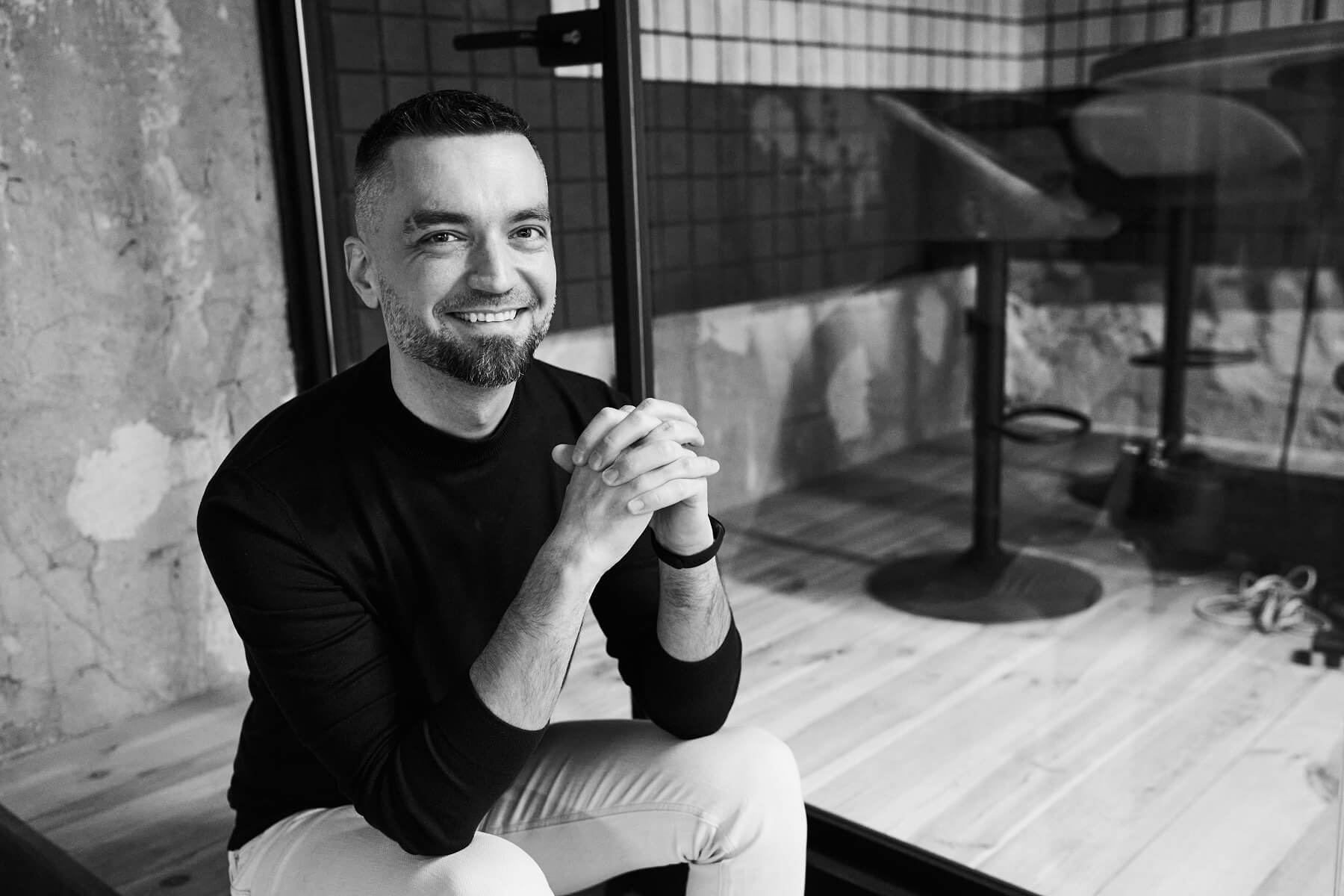
So you grew up among the "creative intellectuals", you work among them ... Have you seen the people of the "real world"?
Listen, well, after all, I have not been sitting in Kyiv all my life. I spent a lot of time in the rural Chernihiv region, in Borislav in the Lviv region, there were trips around Ukraine, life in the Hutsul villages — even if for only a couple months a year, but this is generally enough not to be a “child of asphalt”.
Do you know how to garden?
Oh my god, I still hate this! How much I weeded, how much I rummaged through them! Now I can't stand working in the ground.
That is, you are not yet drawn to the earth.
I am drawn only to the flower garden, which was left by my mother. Now my sister and I will take care of it.
Translated by Kateryna Kazimirova
Until 3 years ago, Ukraine did not have an institution that would systematically and strategically deal with the presentation of modern Ukrainian culture abroad — the way the British Council, the Polish Institute, the Goethe Institute, etc. have been doing for decades. In 2018, the Ukrainian Institute was established as an institution in the field of management of the Ministry of Foreign Affairs, whose mission is to “strengthen the international subjectivity of Ukraine through cultural diplomacy”. The first head of the UI, who, together with the team, developed the principles of its functioning, vision, and strategy, was Volodymyr Sheiko — a cultural manager, diplomat, and international political scientist by education, who previously worked in the British Council. At the end of 2021, Volodymyr won the election for the position of General Director for the second time and will head the Ukrainian Institute for the next three years.